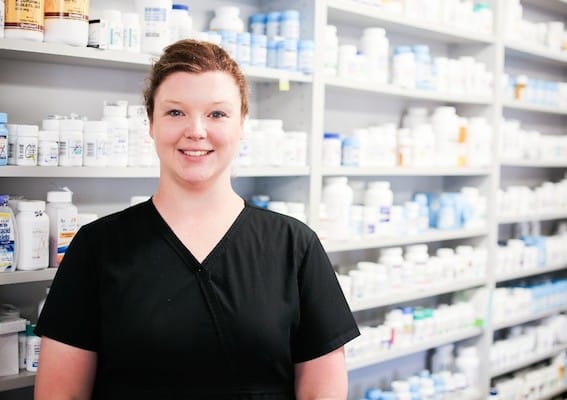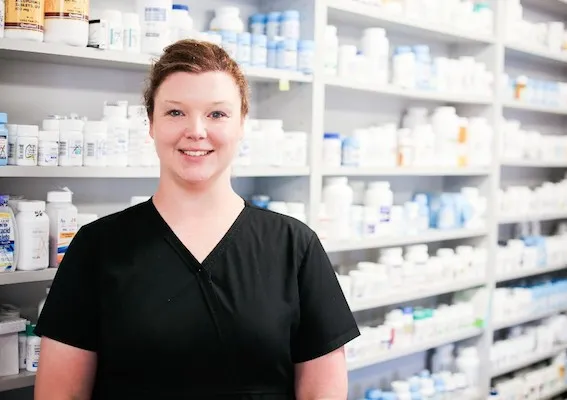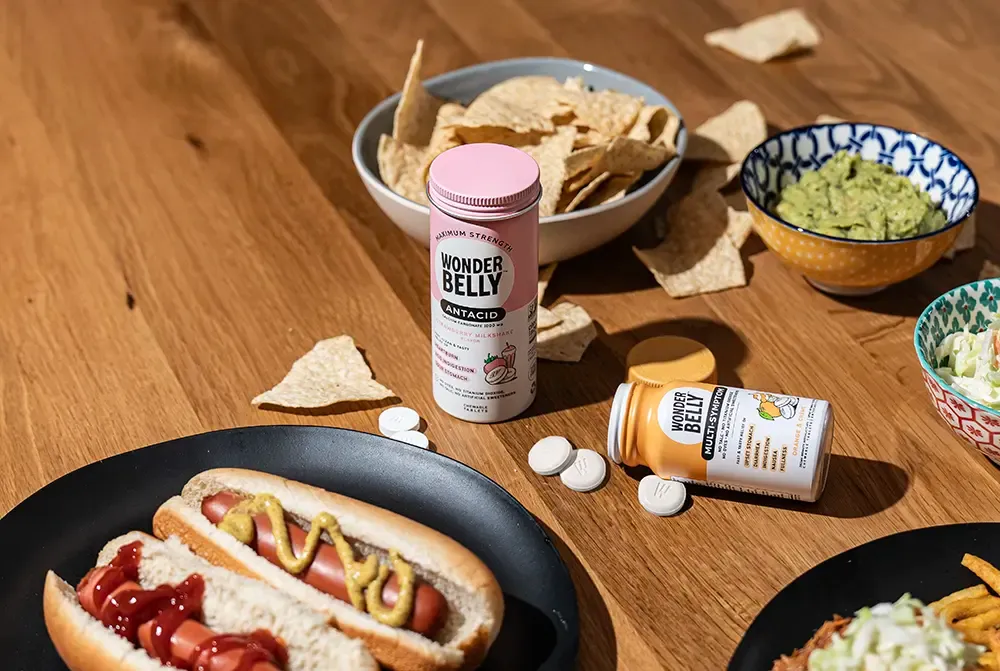TOPEKA, Kan. — Terica Gatewood left a retail pharmacy to work at Genoa, a QoL Healthcare Company, because she wanted a more clinical setting. At the Genoa pharmacy here, inside Valeo Behavioral Health, she has found that environment and then some.
The pharmacy’s mental health specialization, accessibility, one-to-one patient counseling and collaboration with other health care providers make it nothing like Gatewood’s past workplace.

Pharmacy manager Terica Gatewood at Genoa’s location inside Valeo Behavioral Health in Topeka, Kan.
“I was always interested in working for those who really needed my help,” she says. “When my best friend called and said Genoa had an opening for a pharmacy manager in Topeka, I saw that it was exactly what I was looking for. It was a chance to broaden my horizons in a very clinical atmosphere.”
The pharmacy’s location just inside the front door of Valeo allows Gatewood and her staff of six technicians, two interns, two students and a driver to personally welcome patients in and see them out.
When it comes to counseling, she notes that a diagnosis of mental illness can be hard to face, “so we’re able to talk the patient through that. The interaction is much longer, and much more personal, than in the typical retail environment.”
Also fostering close attention to patients is the pharmacy staff’s collaboration with Valeo’s mental health professionals, from medical practitioners to case managers. “There’s a lot of interaction,” Gatewood says. The clinicians will come down to the pharmacy with a complicated case for which they want to know a conversion or a medication a patient may do better on, based on symptoms, “And it’s a two-way street. If I have an issue with a prescription, I just go down the hallway. There are no phone calls or left messages. The patient is taken care of right then and there.”
Above all, Gatewood says, Genoa pharmacists and their patients are well served by the company. “Genoa is dedicated to spending the time and effort to make sure patients are taken care of. The company gives us the necessary tools to make sure we help patients living with mental illness. It’s not about making money off them.” Those tools include adherence packaging, help with patient assistance programs (PAPs), and sample dispensing. Having a pharmacist provide samples — as opposed to doctors handing them to exiting patients — means Gatewood is able to label the medications and make sure the patient knows how to take them. “We’re making sure the patient isn’t just walking out with a brown bag,” she says.
Gatewood also credits Genoa for insisting on adequate staffing. “They believe you need enough staff to talk to patients and make a difference. There has to be a balance, because with too many people you can’t run a business, but with too few it’s a factory. They make sure we have enough so the pharmacist can walk down the hall and talk to a prescriber, or get on the computer and do a medication review, or just sit down with a crying patient after a diagnosis.”
Society still stigmatizes the mentally ill, Gatewood says. “The hardest thing, as a pharmacist, is helping the patient accept the diagnosis. It’s that extra 10 minutes — when they’re really upset — talking about how the medications can improve their situation — that can make a difference. There’s no stigma in my clinic. But these patients fear people judging them, and it’s my job to help them through that.”
A major benefit of her job, notes Gatewood, is the ability to work with the National Alliance on Mental Illness (NAMI). Gatewood has direct contacts with NAMI, including Rick Cagan, executive director of NAMI Kansas, and she supports walks, among other fund-raisers, for the organization.
Her other professional efforts beyond work at the pharmacy include being a preceptor at the University of Kansas School of Pharmacy. Her students teach a class at a detox unit and for the Mirror halfway house for parolees. They are also leading an outpatient group for people in the community to learn about different disease states and medication. Generally, she says, “Anytime we’re asked by an outside group if we’ll come talk about a certain subject, we absolutely will do that. We take them up on that offer.”
As a graduate of the pharmacy school, she says, “I feel I’m definitely giving back to my alma mater. It’s really good to be giving back to your profession, too, by being a preceptor.”
Acknowledging that with all her activities — and two young children at home — she’s very busy, Gatewood says, “I like it that way.”
She looks forward to going to work every day, she adds. “This is a career for me, not a job, and there’s a big difference. I love the managing part where I work with an excellent staff. I enjoy the legislative part, where I’m able to be an advocate for a purpose. And I have a company that supports me. I couldn’t ask for better.”







